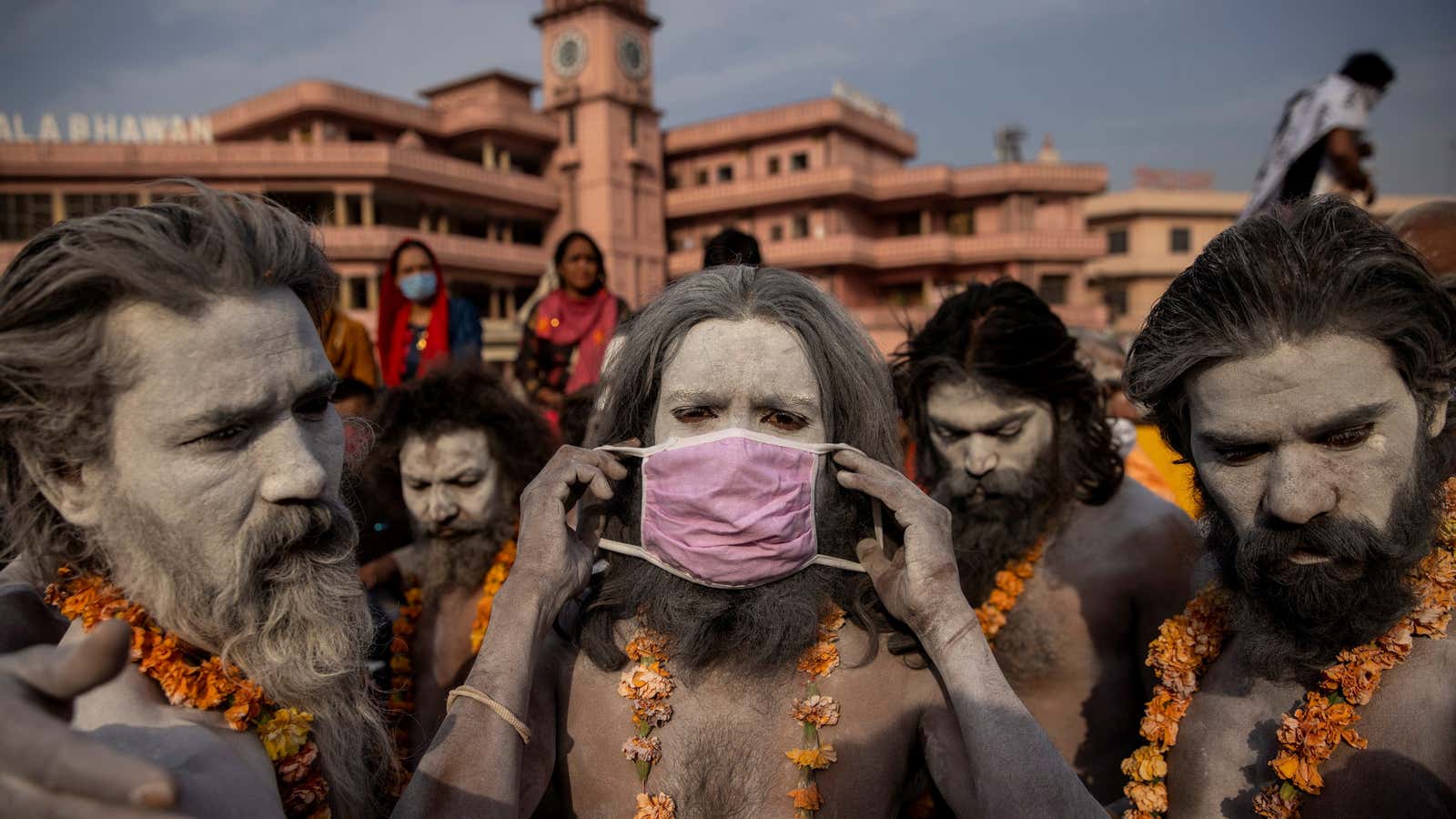The pandemic situation in India is becoming increasingly grim.
India recorded nearly 170,000 new Covid-19 infections and 904 deaths yesterday (April 11), the highest single-day jump in infections in over a year. The country is currently the world’s highest contributor to fresh Covid-19 cases, with numbers worsening every day.
In large Indian metropolises, the healthcare facilities are overburdened. In the western state of Maharashtra—which currently has nearly 40% of the total cases in the country—patients received oxygen support while they sat on chairs because hospitals were all out of beds. The state’s capital Mumbai has consistently seen a high number of daily infections over the past fortnight, touching—and sometimes crossing—10,000 a day.
Mumbai also had to halt its vaccination drive on April 9 because of an acute shortage of shots. Vaccinations have resumed today (April 12) in some of the private Covid-19 vaccine centres.
The state of Maharashtra has stringent restrictions in place to contain the infection spread. People can only step out till 8pm on weekends, and there is no movement—except for essentials and emergencies—allowed over the weekend.
Some of these restrictions are also in place in New Delhi, India’s capital, which is battling its worst-ever Covid-19 surge yet. Yesterday, Delhi crossed the 10,000-mark for new infections for the first time since March 2020.
The Delhi government has announced a fresh round of restrictions, allowing restaurants, movie theatres, and public transport facilities to operate only at 50% of their capacities. The city also has a “night curfew” in place between 10pm and 5am every day.
Delhi also houses India’s executive, legislative, and judiciary buildings, all of which are at serious risk of being Covid-19 hotspots. Source-based reports have said that 50% of the staff at India’s Supreme Court in Delhi has tested positive for Covid-19. Most courts had moved to video hearings and proceedings during India’s coronavirus lockdown, but had resumed in-person hearings once the number of cases came down earlier this year.
The Supreme Court, and the lower courts in Delhi, have all returned to work-from-home and video hearings. The Supreme Court premises are currently being sanitised, and proceedings will be delayed by an hour today, according to NDTV.
Crematoriums are working overtime
The high court in the western state of Gujarat is worried by the low numbers the state was officially reporting, as against the dire situation that was being reported in the news. The high court has issued orders to the state officials to present true numbers before the bench.
Gujarat’s death toll, which is widely being criticised for being underreported, reared its tragic face in other ways. In Surat, the state’s merchant hub, grills on gas furnaces melted at the city’s crematoriums because of continuous funerals. “Earlier we used to cremate 20 bodies in a day of which few were cremated on a wood pyre while others were cremated in gas furnaces. The load was limited and each furnace got enough time to cool down,” an official at Ramnath Ghela Crematorium told The Times of India newspaper. “But now, we are handling over 80 bodies daily and each furnace is in use round the clock. Hence the iron frames have started melting and breaking.”
While the Covid-19 numbers turn alarming by the hour, some pockets of India are carrying on as though there was no pandemic.
Modi’s election rallies in West Bengal
The eastern state of West Bengal is currently holding its elections in eight phases. And prime minister Narendra Modi—along with his lieutenant, home minister Amit Shah—have been hosting mega rallies in the state. Today (April 12), Modi has three rallies planned before Bengal’s fifth election phase.
The prime minister, who has thus far been on point with his messaging on masks, has been heavily criticised for hosting these events in the middle of a Covid-19 surge. India’s election commission announced on April 10 that it would ban rallies if it found political parties were not being mindful of social distancing or masking rules.
A Kumbh Mela in the middle of a raging pandemic
The Kumbh Mela, a mega congregation of Hindu believers, is currently underway at Haridwar, on the banks of river Ganga. At least 3 million people have gathered in the temple city, most of them taking a dip in the water that Hindus consider holy, and believe it washes away their sins.
A large swathe of humanity was gathered on the riverbank yesterday (April 11) for the shahi snaan (royal bath), which is likely to continue today.
The state government of Uttarakhand has placed nearly 350 AI-enabled cameras that can identify those who are not wearing masks, according to The Indian Express newspaper. On April 2, 1,500 fines were issued for those not complying with the mask mandate.
And yet, photographs of large crowds, gathering at a time when hospitals are crumbling under the pressure of new infections, is alarming.
